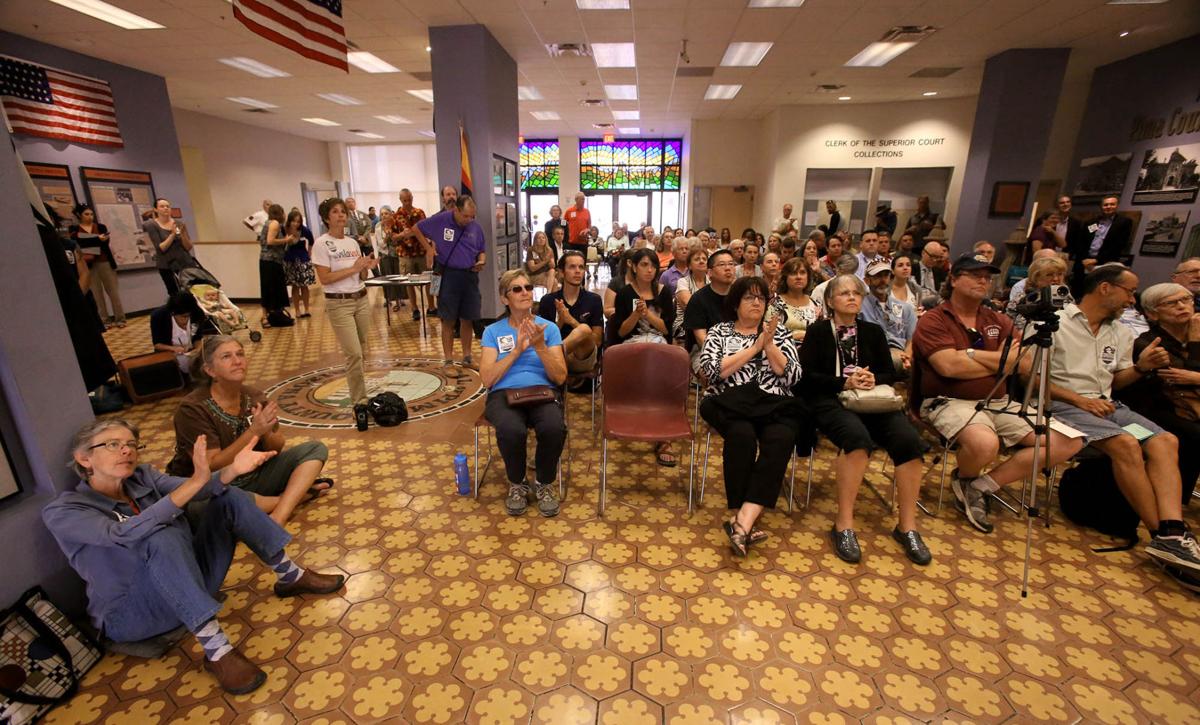An ambitious Pima County bond plan went down to defeat Tuesday night despite support from a vast coalition of business, nonprofits and neighborhood interests.
The consensus among many insiders is that the overall package might have been too massive for voters to handle.
“Maybe the numbers were just too big,” Pima County Supervisor Richard Elías said. Elías supported the bond proposal, but said the $815 million price tag was just more than voters were ready to take on.
The county asked voters to approve a seven-question proposal that included nearly 100 projects. The projects covered road repairs, new highway construction, parks, tourism promotion and economic development.
The bonds would have required an increase to the secondary property tax rate. If all the questions had passed, the rate would have increased to 81.5 cents per $100 of assessed value, up from 70 cents now.
That would have cost the average Pima County homeowner, with a house valued at $152,000, about $59 per year over the life of the bonds.
“A lot of people just don’t want to throw good money after bad,” said Marana Mayor Ed Honea, an opponent of the bonds and frequent critic of Pima County. The bond proposal was too big and attempted to push too many projects for voters to support, he said.
“I think there was a trust factor, and people just had enough,” Honea said. “I think this sends a message to the county.”
Opponents of the bonds focused some of their criticism on the county’s tax rate, which combined stands at $5.96 cents, and debt load, which is more than $1.2 billion.
County officials and bond supporters countered that Pima’s per-capita debt is actually less than many Phoenix-area cities and towns.
They also disputed claims of high taxation, noting Pima County relies almost solely on property taxes for funding while other counties have adopted sales taxes and other revenue measures.
It might be time for Pima County to do the same, said Supervisor Sharon Bronson, a supporter of the bonds.
“I think what voters said loud and clear was they don’t like debt financing,” Bronson said. “We need to find a pay-as-you-go method.”
That method, she said, could be a countywide sales tax, which would require unanimous board approval, or a reconfiguration of the Regional Transportation Authority half-cent sales tax to fund road repairs as well as new construction.
The county should find a different way to move ahead with the road repair and Sonoran Corridor proposals rejected in Tuesday’s election, she said.
The Sonoran Corridor plan would help fund a connection between Interstates 10 and 19 south of Tucson International Airport.
Proponents say the plan is the most important economic development proposal in a generation because it could facilitate new business development in aerospace, defense and logistics.
“If we can’t move forward with that, we have no economic future,” Bronson said.
Honea said the region can move forward — it just won’t do it at the direction of the county. “The regional bonding approach has been forced on us,” he said.
Honea said he sees a future where the county gets out of the bonding business and leaves funding of public works projects to individual cities and towns. “I think Pima County bonds are dead,” Honea said.
The failure of the bonds represented a loss for the entire region, Tucson Metro Chamber President Mike Varney said. “It really resets the community back to square one,” he said.
Varney said he also was concerned with the message voting down the Sonoran Corridor and other roads projects sent to major employers like Raytheon.
“We’re not going to fix our roads, we’re not going to invest in our economy,” Varney said. “We just really shot ourselves in the foot here.”
The election shows people have frustration with politics and government, University of Arizona political science professor Tom Volgy said. But, he added, too much shouldn’t be read into the results.
“Clearly, the disenchantment was not strong enough to unseat any of the incumbents,” Volgy said about the City Council elections, in which three sitting council members were re-elected.
The low turnout, with perhaps as few as 30 percent of eligible voters casting ballots, worked as an advantage to those working against the bond plan.
“As turnout goes down, people in opposition to proposed tax increases see their power go up,” Volgy said.
He speculated the outcome of the bond election would have been different had the county decided to hold the vote for 2016. That’s when county supervisor and presidential contests would increase voter turnout.
Speculation aside, Elías said he intends to listen to what voters said on Tuesday.
“If there was this much discontent for the seven bond questions, we should have known,” he said. “My comment is: Message received.”





